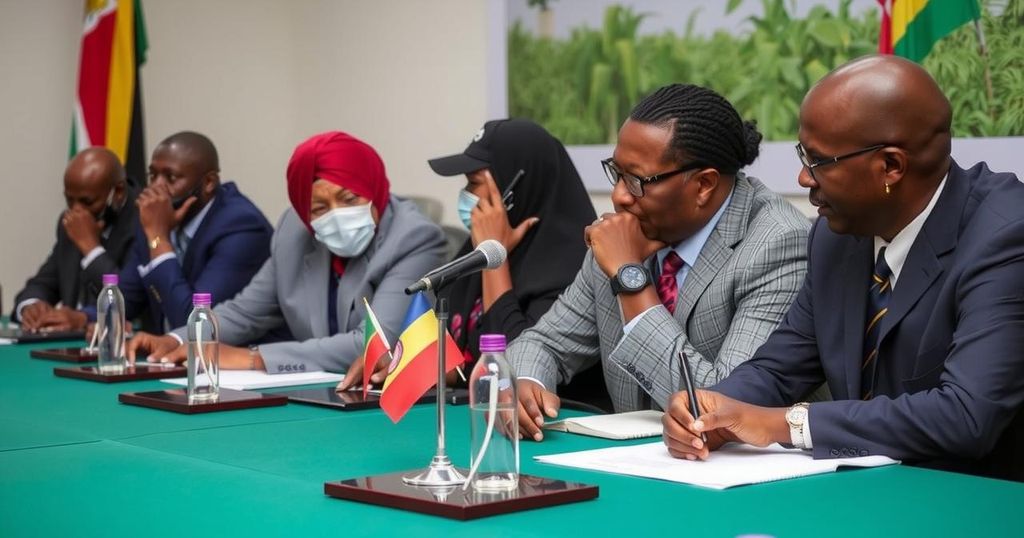Politics
AFRICA, AMNESTY INTERNATIONAL, BORGES NHAMIRRE, CORRUPTION, DANIEL FRANCISCO CHAPO, DEMOCRACY, DEMOCRATIC REPUBLIC OF CONGO, EAST AND SOUTHERN AFRICA, FRELIMO, INSTITUTE FOR SECURITY STUDIES, KHANYO FARISE, MOZAMBIQUE, REGIONAL COOPERATION, SAD, SADC, SOUTH AFRICA, VENANCIO MONDLANE, ZAMBIA
Isaac Bennett
0 Comments
SADC Ready to Assist Mozambique Amidst Post-Election Violence Crisis
Mozambique is facing a significant crisis following the October elections, with over 100 deaths attributed to post-election violence. The Southern African Development Community, led by Zimbabwe’s President Emmerson Mnangagwa, has expressed willingness to assist in restoring peace. South Africa highlights the necessity for dialogue, with human rights organizations condemning the government’s violent crackdown on protestors. Experts emphasize that dialogue is essential for resolving the situation and reopening Mozambique’s closed ports for regional trade.
The ongoing post-election crisis in Mozambique, which has resulted in over 100 fatalities amid escalating violence, has drawn the attention of the Southern African Development Community (SADC). President Emmerson Mnangagwa of Zimbabwe, currently chairing SADC, has indicated the bloc’s readiness to assist Mozambique in resolving the turmoil following the contentious October 9 elections, where the ruling Frelimo party has faced allegations of electoral malpractice. South African officials have also emphasized the urgency for dialogue among the conflicting parties to restore peace.
In a recent statement, President Mnangagwa called for an end to the violence, coinciding with the announcement of the Constitutional Council’s decision that awarded a 65% electoral victory to Frelimo. Concurrently, South Africa’s Minister of International Relations, Ronald Lomola, underscored the necessity of dialogue, stating that South Africa stands ready to facilitate discussions aimed at healing Mozambique’s political wounds. Lomola’s sentiments were echoed by Venancio Mondlane, a prominent opposition figure, who criticized the focus on inter-group strife rather than collaboration for national improvement.
Human rights organizations have raised alarm over the Mozambican government’s oppressive response to dissent. Khanyo Farise of Amnesty International condemned the excessive use of force by police against demonstrators, reporting injuries and fatalities resulting from these actions. This severe crackdown has prompted greater calls for governmental accountability and adherence to civil liberties.
Furthermore, Borges Nhamirre, an analyst from the Institute for Security Studies, highlighted the economic ramifications of the unrest, pointing out that Mozambique’s ports remain inactive, which adversely affects regional trade and exacerbates hardships for its citizens. He asserted that dialogue is the most viable pathway toward resolving the crisis and restoring stability in the region.
With concerted efforts from regional bodies and opposition leaders advocating for peace, there is cautious optimism regarding Mozambique’s prospects for recovery from this challenging situation.
Mozambique has been engulfed in violence following disputed elections held on October 9, where the ruling party, Frelimo, was accused of electoral fraud. The aftermath has been marked by significant protests, leading to a heavy-handed response from law enforcement, drawing criticism from human rights advocates. The situation has alarmed neighboring countries and regional organizations, prompting calls for dialogue and assistance to restore order and promote democratic governance. The SADC, under the leadership of Zimbabwe, has expressed a commitment to support efforts aimed at ending the unrest in Mozambique.
The recent developments in Mozambique, characterized by violent protests following closely-contested elections, have necessitated urgent intervention from the Southern African Development Community. President Mnangagwa’s leadership, alongside calls for dialogue from South Africa and human rights organizations, reflects a collective desire for peace. Addressing the country’s political and economic challenges through open communication is paramount if Mozambique is to navigate its current crisis and emerge more resilient.
Original Source: www.voanews.com




Post Comment